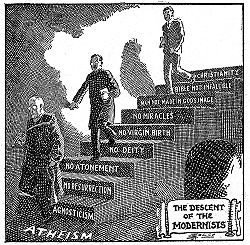Today’s most aggressive atheists, the "New Atheists," boastfully assume that they have basically taken the field against their opponents, by some sort of intellectual D-Day Invasion, by which the future certainty of defeat appears completely inevitable. But, what, upon a more objective examination, is really going on?
A straw man of a "god" gets itself created in the fetid imaginations of mainly middle-aged and aging men who do have developed their own (idiotic) version of a kind of proverbial old wives tales of a just truly contemptible, worthless, pitiable, wretched, debased, laughable, absurd, pathetic deity of no (genuine) consequence. Why is this critically said?
The Lord God Almighty who, in anthropomorphic terms, holds the entire universe and beyond in one tiny corner of one hand, as if it were a mere speck of microscopic dust, is not really the kind of god that these seemingly clever fellows are protesting against or, rather, simply denying the existence of in its entirety. Deniers of the Great Lord of Hosts, to show their toughness and courage, prefer to do shadow boxing with only a fictional, diminutive pygmy of a reductionistic representation of a god, not the Supreme Being of the Old Testament who did mightily smite all the degenerate inhabitants of Sodom and Gomorrah.
Moreover, true faith as religion is the direct opposite of superstition and does not participate at all in religiosity; this is concerning the highest understanding and comprehension of religious truth concerning specifically what God is or is not, especially in terms of Christianity and, more in particular, Roman Catholicism.
The diminished and deniable deity of convenience (also aided ironically by what gets called process theology) of these militant atheists is not ever justifiably worthy of any worship, much less the wasted intellectual effort to profitlessly deny its so putrid existence. What gets excessively disparaged, often in hyperbolic terms of thoroughgoing deprecation, is a supposed kind of odd divinity that does not at all possess any axiological, epistemological, or ontological significance whatsoever; it is a projected being that has been comprehensively philosophically emptied of what ought to logically be the true attributes, powers, abilities, etc. of a really and suitably genuine, not ersatz, Supreme Being.
Minimalization of Divinity Becomes Obnoxious
Thus, when the irregularly concocted straw man of a (mental-construct) god does not quickly jump up and, presumably, dance on command of these atheists, they jocularly set about scorning and denying its power, its very existence, moreover. They, perhaps, cannot see that such a proposed spirit entity is not worth the intellectual effort expended for developing excessively elaborate refutations for what is said, by them, to not really exist at all.
Claiming that they are righteously energized to morally write up stuff because of the alleged great evil, injustice, corruption, etc. let lose by believers forces them to adopt language of a theological order of exposition, through the making of ethical and/or moral judgments; altruists and humanitarians can exist as such by, e. g., their appropriation, directly or indirectly considered, of religious thinking as to ethics and morality related to human conduct. Furthermore, ethical and moral judgments, as to ultimate reasoning, must be based, premised, upon some sort of philosophical point of view that was, in turn, derivative from theological assumptions or assertions, either directly or indirectly applied.
But, it is pompously claimed, by atheists, that no god really need exist for the proper having of ethical or moral categorical imperatives, while using the language of religion, more or less, to then morally and/or ethically condemn religion. Nonetheless, should it be honestly added, into the mix, that the absurdly proffered kind of “tin god” or deflated divinity, assumed to be the convenient whipping boy/girl/it of the aggressively unbelieving minority, is not worth a bucket of warm spit? Get real here.
What is going on, in a special sense, is the presentation of a kind of magic show, extravagantly put on by the militant atheists, with their amusing and distracting verbal sleight of hand tricks, and vain poses of their being holier-than-thou holders of the high ground of debate. They, ironically, stand in haughty judgment of a (nonexistent) god and, without question, do find he/she/it to be forever found wanting.
All this ribald nonsense, one guesses, is supposed to supremely delight and sagaciously inform advanced intellects suitably inclined to accept, without qualifications, such an inadequate performance by terribly amateur and inept magicians. It is hard, however, to take them seriously. What will be dealt with here, however, is not personal attacks upon such people, whose names will not even be mentioned. The discussion will, instead, concern itself with the epistemological assumptions and fallacies by which an odd conglomeration of contradictory contentions, assumptions, perceptions, and guesswork gets itself transmogrified into supposed sustainable argumentation.
First and foremost, the proposed “god” is circumscribed and dislocated, delimited and displaced, such that it is damned if it does and damned if it does not have the abilities to greatly inspire avid adoration as a Supreme Being of a high order of Being. Elements of the thinking (as certain readers may probably recognize) of G. K. Chesterton, with all its superb irony, and St. Thomas Aquinas, with its indisputable logic, will be called into the debate or discussion as needed.
Consequently, an effeminized and so quite sickly deity or pseudo-divinity, filled with endless love qua universal salvation regardless of how much evil, hatred, perfidy, etc. might be honored by miscreant humans, is thoughtfully postulated, by the atheists, who dare not risk attacking a masculine and healthy Divine Person capable of metaphysical or physical retribution, if grievously offended.
Such a pitiable or pathetic god, meaning the former kind mentioned above, is a rather bad joke in terms of what is supposed to be capable of being known about such a deity, as to then epistemologically valid knowledge. The assumed “god” that gets easily mocked and sarcastically abused as such is yet suitable for bewildered children, crazed feminist militants (who lust for their version of a female divinity), and others who usually prefer, on average, rather unsophisticated and minimalist theological creations, as to their thaumaturgic efforts.
Deists, as is known, have their ghost of a god who may have been involved in Creation (whatever that might have been) but then functionally absconded quickly to leave the mess, the universe, in the hands of temporal creatures who do often—surprise, surprise—think of themselves as being gods.
Going yet one step wildly better, the atheists deny completely any metaphysical order as to its existence and do then assume that the wish can give birth to the thought; but, every cognitive attempt (as an act of will) to metaphysicalize material reality qua materialism (by any euphemism) necessarily results in the reification [Editor's note - that "reification," making 'real' supposedly, by their sophism, of course results in deification of themselves and physical reality; this is only yet another version of the ancient Gnostic heresy] of material order for what can only be correctly understood as metaphysical reality. The physical brain of a man, thus, never reveals the existence of the mind that is totally unseen within all of the gray matter of a brain; yet, it is known that it, the mind, is still there regardless. The complete lack of a visually perceived intellect does not, therefore, meaning axiomatically or otherwise, negate its actual existence, for even empiricism has its limits.
Analogously, the quite laughable inability of an atheist, a limited mortal creature, to perceive the totality of the Lord God Almighty can very well be naturally because Absolute Being, by definition, necessarily surpasses, of course, all of the (mere) universe and beyond it as well. Among others, the truly sagacious Chesterton, therefore, would have easily recognized a quite preposterous solipsism when he saw it.
A number of “presumably” intelligent people are so disproportionately concerned about disproving the nonexistence of nothing in that, e. g., it is being openly said that “god is not great” as an overt rhetorical means of stressing their existential distain, which is absurd. Really now, what is going on here?
As to any needful cognitive reflection upon epistemological certainty, if there is really no order that is, in fact, posited as metaphysical, then how can, by definition, the imperfect intellectual powers of mere mortal creatures apprehend, with requisite supreme certainty, either that assertion or, perhaps, its opposite?
The plain answer is that only atheists, especially the aggressive or militant kinds, are both willingly and winsomely prepared to ever make such massively preposterous quantum leaps, in the rarified realm of advanced epistemology, as if it were as commonly simple as taking a stroll in Piccadilly Circus, according, at least, to Chesterton, and as properly verified by Aquinas. What is actually going on, nonetheless, is not so much an act of intellect as it is rather a bold act of (obstreperous) will, though not supported by systematic and well-founded reason; it is, however, upheld substantially by (petulant) rationalism, the parodying of rational thought, not its confirmation.
What is certainly revealed, upon cogent and intelligent examination, is the pubescent charm of atheism, the false negation of metaphysics, exposed to a candid world. As Ludwig Ott had insightfully contended, “An inculpable and invincible ignorance regarding the existence of God is not possible for a long time in a normal, grown-up person…” And yet, how can this understanding be forcefully demonstrated through sustained argumentation?
Fr. Vincent P. Miceli’s The Gods of Atheism, a brilliant exposition, would appear to be useful reading for exposing the seemingly clever legerdemain going on concerning how rationalism, naturalism, secularism and materialism are just disguised as being merely normal ways of reasoning; but, actually, rationalism, because of its integral devotion to nominalism, inverts reason as in the notably perverse way that Karl Marx had willfully turned the Hegelian dialectic upside down, as has, in fact, often been shown.
Miceli correctly understood, as detailed in his well-argued tome, the four main projections of deities as gods who are presented, by atheism, as adventures of the mind, passions of the heart, myths of the modern mentality, or victims of man.
There are people, however, who were not just simple atheists but, rather, avid antitheists such as were Comte, Feuerbach, Marx, Nietzsche, and Heidegger; as an extension of certain related considerations, furthermore, some commentators contend that thinkers such as Marx, due to their higher intellect, really knew that God exists but preferred, for ideological reasons, to presuppose the counterfactual of atheism; in other words, better minds really do know that it is actually a kind of elaborate intellectual game being played, though lesser intellects can be (easily) fooled, especially militant atheists, of course.
On the other hand, secular humanists or even hard-core materialists do not do without having their own version of a god, be it called Progress, Science, Evolutionism, etc., whatever dramatic form of idolatry may be thought suitable to a supposedly progressive mind that is, actually, atavistic in the final analysis, for the greatest superstition of them all is, therefore, to supinely think that one’s own era is beyond all superstition.
Or, as Miceli, a traditionalist Roman Catholic, rightly phrases the asserted matter, in an expanded context, “the believer In God accepts the vision of science and harmoniously raises it, through free, intellectually creative activity in the science of theology, to the infinite degree of inexhaustible wonderment.”
In contrast, one, thus, correctly sees that “the atheist, terrorized by intellectual insecurity” limits himself deliberately to the new obscurantism of “the space-time-matter horizon.” In the end, one unfortunately perceives, with a forever heightened clarity, that: “Atheism is an idolatry which worships that strange God—absolute Man.”
Miceli, shrewdly, knew that there is always atheism’s “arrogant assumption of divinity and its self-indulgence in egocentric absolutism.” Militant atheism, furthermore, can only successfully exist within a degenerate narcissistic culture dedicated to freely celebrating hedonism, materialism, secularism, rationalism, and what, as Nietzsche knew, must be the logical end destination of it all: Nihilism. With the dis-valuation of divinity does not, therefore, come the too often assumed exaltation of MAN but, rather, the narrowing of the focus of earthly reality toward an intramundane salvation offering the human egalitarian equivalent of a barnyard environment, not the (often promised) New Eden of Utopia; but, what is more urgent to know is that such a matter as Original Sin is factually evidenced, as noted by Ludwig Ott, in the existence of atheism.
So, when all is ultimately said and done, the then tinier and more insignificant the god that the militant atheists, axiomatically, do dismiss from rational(ist) consideration, the more shrunken and meaningless becomes the, thus, fairly ignominious human being not made in the image of the true God. From the greatness of people whose immortal character of their souls can be as mightily tall as their God, there is, on the other hand, the atheist’s nominalist desire to have humanoids revert to being the mere physical (read: materialist) stature, importance, of their ever-shrinking selves.
The egocentric narcissistic humanoid, thus, so fantasized into broad existence, by the aggressive secular humanists qua materialists, becomes as vilely and nauseously pathetic as the pathetic deity that is denied its (then, by definition, meaningless) reality. The purported accurate “knowledge” of such a diminished deity, transmitted by those who axiomatically deny the existence of what they claim cannot exist anyway, creates an epistemological dilemma of vast proportions, though it is not addressed by the militant atheists engaged in their profuse semantic magic.
How can anyone positively affirm, without a doubt, the nonexistence of nothing, the inability of there being any metaphysical order? In other words, by what metaphysical/philosophical knowledge was it obtained, in contradiction, by which a human mind can so deny, with what must be supreme certainty, metaphysical knowledge of a metaphysical order, which is, vigorously, claimed not to be?
Circular Reasoning as Non-Thought Exposed
There is no rational way out of this tautology because the faulty reasoning employed must continually run in circles to try vainly to escape the truth of its cognitive falsity. The atheist must assert knowledge about what cannot be truly known in that such asseverated knowledge is, by definition, logically beyond the assumed capacity of the atheist to actually possess, certainly with any certainty, that is. This conundrum is not, however, ever lessened by the absurd constructing of endless arguments seemingly to convince people about the purported nonexistence of a pointless, meaningless, and senseless god, which, anyway one looks at the matter, does not exist anyway.
Once this is intelligently realized as to the obvious implications and ramifications necessarily involved in such idle speculation, the aggressive atheists qua secular humanists or materials are no longer thought of as assumed mental giants disposing of a false mystery. Tautology set alone is not, repeat, is not any kind of valid argumentation, regardless of any and all added rhetorical flourishes, as the sound and fury signifying nothing.
For atheists, all of their nominalism necessarily reaches just a dead end. First, the modern age qua modernity in thought illegitimately reversed objectivity and subjectivity; postmodernity, as with, e. g., deconstructionism, has gone the step further by denying the existence of both such cited categories, along with any knowledge of anything that used to be called truth. Moved by the (demonic) lusty spirit of everlasting negation, atheists, of course, do fit in well with such a cognitive situation, especially in academia with its various degrees of celebratory nihilism qua mental fornication.
They then quickly become revealed, startlingly, as seemingly unprepossessing minds making what are merely vacuous statements, exposing a tedious reductionism, that metaphysically attempt to deny the metaphysics of any metaphysical order (AKA God). With reductionistic logic, the fundamentally difficult epistemological problem encountered assumes vastly quantum proportions, beyond the propagandistic and rhetorical capacities of the unbelieving affirmer, who looks quite ridiculous; this is, moreover, as a direct result of so pushing the insubstantial assertions of atheism. How might this, however, be easily empirically proven?
Among other (notoriously) famous atheists of the past, Voltaire quite accurately knew just how very insubstantial and inconsequential the entire intellectual position of atheism always is; he, being a true radical-bourgeois intellectual qua Frenchphilosophe, had to go to a Benedictine monastery to read through a good copy of St. Thomas Aquinas’ Summa Theologica to just copy out that saint’s very careful compilation of the presumably “best” arguments assembled in favor of atheism. Exactly, the cognitive ability of this 13th century religious teacher, scholar, and author fully surpassed all of the brains of the philosophes of the entire 18thcentury, which ought to be regarded, at a minimum, as highly significant concerning the true power of reason, as so markedly possessed by a saint of the Roman Catholic Church.
Notably but not unexpectedly, Voltaire, of course, never ever bothered to, also, copy down the quite effective and knowledgeably solid refutations of all those arguments for atheism. He knew better than to rely upon his or any other committed atheist’s meager and limited mental capacity. But, of course, the direct opposite can certainly occur.
In the early 21st century, no less a personage than Anthony Flew, a once prominent nonbeliever, felt intellectually and ethically compelled to finally admit that he was, in fact, totally wrong; there is definitely, he confessed, a God as is so indicatively based upon, e. g., the latest scientific findings in advanced physics, chemistry, etc. of the great realities involved with the immense universe. All his former (supposedly) impressive efforts at philosophical prestidigitation came to naught.
On the other hand, the highest epistemological problem is that of attaining what would need to be, in fact, perfect knowledge on the part of, by definition, imperfect creatures qua human beings who cannot have the requisite perfection of knowledge short of becoming godlike; this to-be-wanted perfection of knowledge would as such totally guarantee that it would be definitely known as to whether or not there was any reality to the metaphysical order, as to its presumed nonexistence; otherwise, it is often too logically difficult to prove a negative, though atheists assume it every time they supposedly pontificate, knowingly, about what they do insist cannot exist; in the categorical absence of mortal persons being gods, there is, thence, no actual godlike knowledge to be obtainable, within such a temporal context of cognizance qua knowledge.
As Aquinas had correctly pointed out, many centuries ago, even any human knowledge of God is only, at best, analogical, not direct in nature, because only God, by definition, can, thus, really understand the Supreme, Absolute or Divine Being Himself. Therefore, atheists, as committed hyper-nominalists, are forever caught in a perpetual epistemological contradiction by claiming it, the actual knowledge, both ways in contradiction at the same time and condition as per asserted knowledge. Why is this true?
Absolute denial of metaphysical order commands that a (superior) metaphysics is intimately possessed that subsumes, moreover, all total cognizance pertaining to having knowledge that surpasses what is denied; but, the last time that anyone noticed, as Chesterton would have agreed, not even George Bernard Shaw (a once past celebrated nonbeliever) had manifested his divinity enough to demonstrate any positive admission of divine afflatus; nor, among other missing (but necessary) attributes, had Shaw ever, e. g., levitated, in public, in any of the quaint streets of London.
In short, any such true epistemological capacity so claimed, at an extremely exalted level of supreme knowledge, would then absolutely entail having other wondrous capacities and stupendous capabilities of a manifestly extraordinary or quite astonishing nature. However, neither situation of a metaphysical epistemology nor an epistemological metaphysics can, adequately, make up for the lack of possessing divine knowledge. To really know definitively, meaning without any rational question whatsoever, that there is, in fact, no God would, in noetic translation, positively require a superior level of truly absolute knowledge; this would, in turn, have to then incredibly encompass a universal cognizance of all levels of possible means of greatly knowing, of astounding omniscience, hitherto denied to all mere mortals.
Conclusion
When (deified) Man is no longer seen reified as (a terrene) God, then (the true) God can be God. And, basic knowledge about the reality and existence of a Supreme Being always ultimately explodes the absurd straw-man divinity put together, haphazardly and childishly, by many severely inferior intellects reaching well beyond their limited capacities and capabilities.
Under the amassed weight of what can epistemologically be known about the key attributes of the Lord God Almighty, the atheist’s attempted pathetic god fallacy of a pseudo-epistemological rendition of such defective quasi-theological nonsense, supposed to be substantial enough for purposes of combative argumentation, fails yet miserably, upon examination, to sufficiently or substantially sustain any rational credibility. To wit, it is the case that what gets vociferously denounced and throw out the front door ends up being surreptitiously smuggled through the back door; thus, the (inverted) religion of atheist humanism seeks to become some sort of perverse substitute faith offered to the world at large, though, in fact, relatively too few people are ever easily attracted to or, moreover, warmly persuaded by this terrene religion.
As Fr. Miceli makes sustainably clear, moreover, in his The Gods of Atheism, the nature of unbelief is truly unsustainable and untenable as to cognitive recognition that metaphysics (of whatever nature, diminished or otherwise) actually presupposes a true metaphysical order that mere human beings qua atheists do baselessly deny at their intellectual and, ultimately, spiritual peril.
Contrary to what the belligerent unbelievers may wish to believe, the true God as God is, therefore, not an inconsequential, negligible proposition qua supposition just conjured up by some oddly effete mental midgets.
Athanasius contra mundum!
Bibliography
St Thomas Aquinas, Compendium Theologiae.
St. Thomas Aquinas, Summa Theologica.
Christopher Dawson, Religion and Culture, 1947.
Christopher Dawson, Religion and the Rise of Western Culture, 1950.
Fr. Vincent P. Miceli, The Gods of Atheism, 1971.
Ludwig Ott, Fundamentals of Catholic Dogma, 1952.
 Cairo – Associated Press - An Alexandrian misdemeanors court sent shock-waves through Egypt on Wednesday when it sentenced 21 young girls, aged 15 to 22, to serve 11 years in prison for holding a peaceful protest supporting the ousted Islamist president Mohamed Morsy on the Corniche in the coastal city. Seven of the girls were minors, aged 15 to 17 were handed heavy prison sentences for protesting in a court ruling Wednesday that came a day after police beat and terrorized prominent female activists in a crackdown on secular demonstrators under a tough new anti-protest law.
Cairo – Associated Press - An Alexandrian misdemeanors court sent shock-waves through Egypt on Wednesday when it sentenced 21 young girls, aged 15 to 22, to serve 11 years in prison for holding a peaceful protest supporting the ousted Islamist president Mohamed Morsy on the Corniche in the coastal city. Seven of the girls were minors, aged 15 to 17 were handed heavy prison sentences for protesting in a court ruling Wednesday that came a day after police beat and terrorized prominent female activists in a crackdown on secular demonstrators under a tough new anti-protest law. This week, security forces have moved against secular youth activists opposed to the military and police. Some government supporters warn that its actions are widening the base of the opposition and could bring together Morsi supporters and secular activists, though the latter bitterly oppose the Islamists and Morsi as equally authoritarian. The crisis is fragmenting the loose coalition of liberal and secular groups that supported the military in its July 3 removal of Morsi.
This week, security forces have moved against secular youth activists opposed to the military and police. Some government supporters warn that its actions are widening the base of the opposition and could bring together Morsi supporters and secular activists, though the latter bitterly oppose the Islamists and Morsi as equally authoritarian. The crisis is fragmenting the loose coalition of liberal and secular groups that supported the military in its July 3 removal of Morsi.




























 [Father Alois Grimm 1886-1944]
[Father Alois Grimm 1886-1944]



